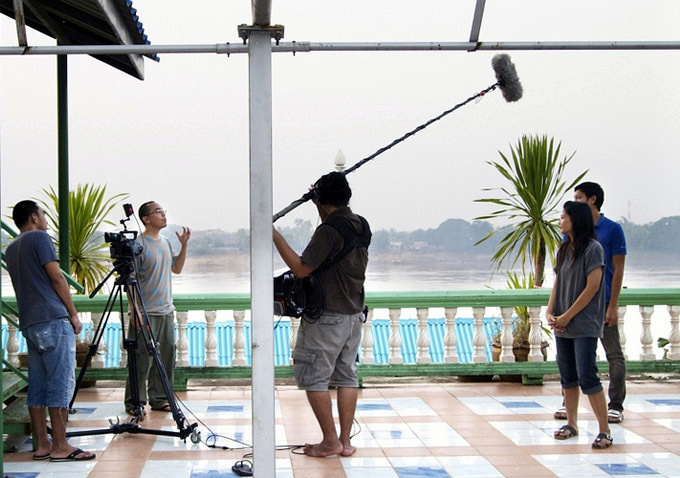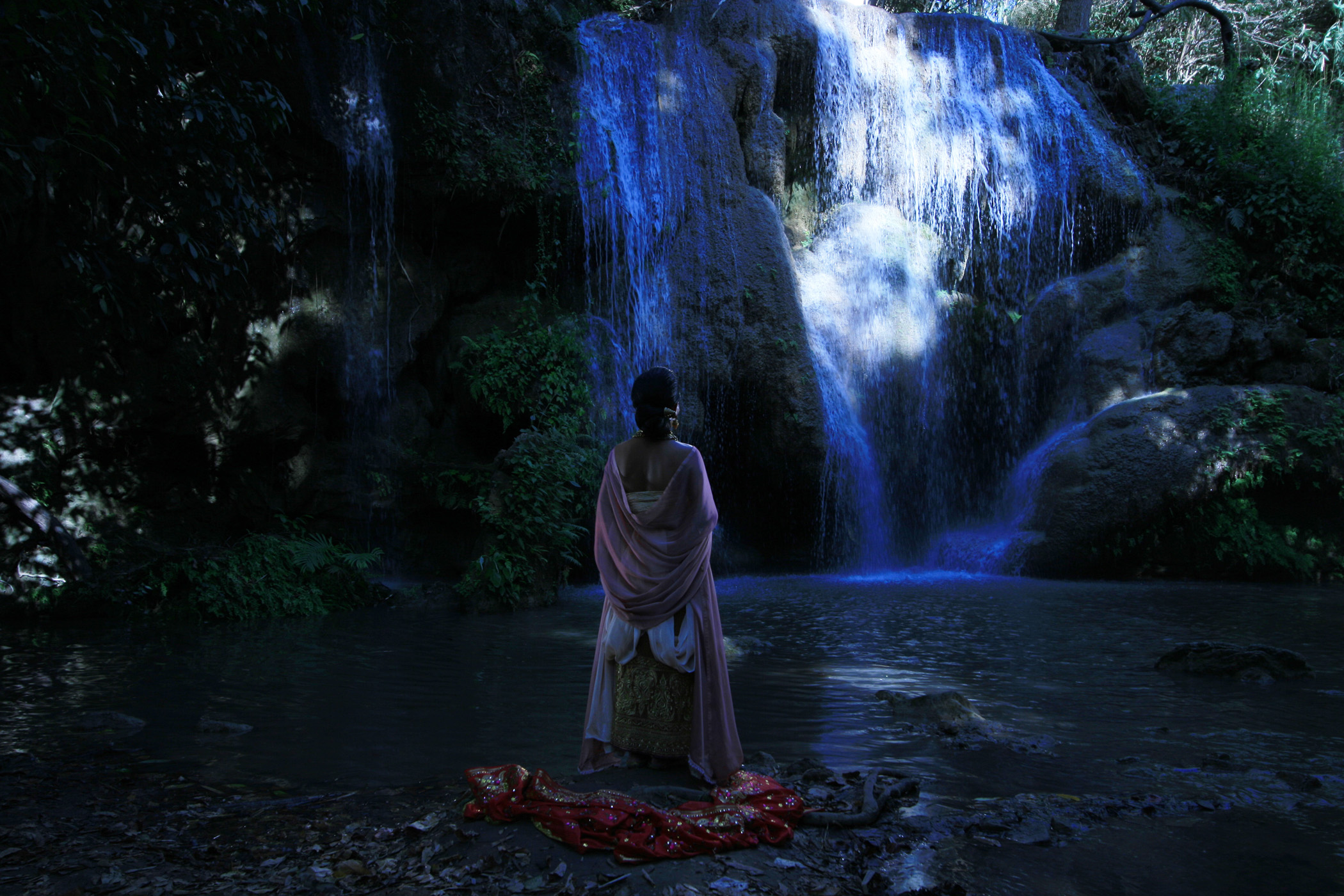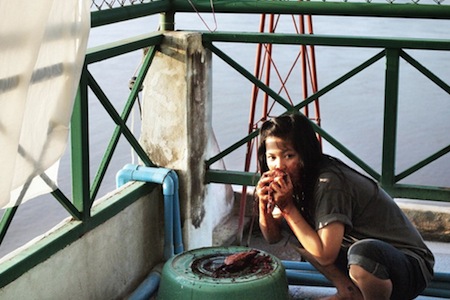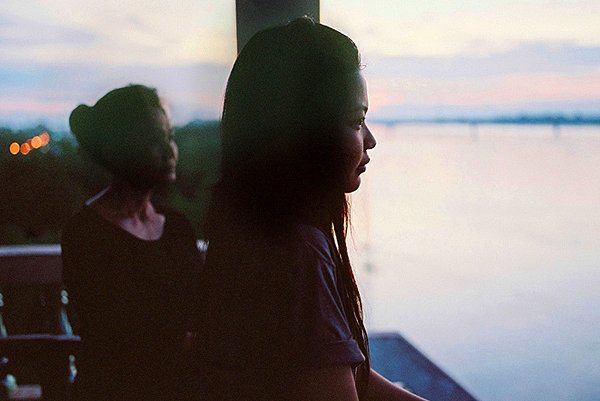Apichatpong “Joe” Weerasethakul is one of the most unique and rare talents in the contemporary filmmaking. Despite the seemingly hermetic, non-linear, intuitive nature of his storytelling, he won over the hearts of critics—and the audience—in Cannes, winning the Palme d’Or for Uncle Boonmee Who Can Recall His Past Lives two years ago. This year he came back with Mekong Hotel, a tender, magical, intimate hour-long essay on life inspired by the Mekong River. Weerasethakul is humble, charmingly unpretentious and surprisingly funny. We talked about borders, ghosts and, strangely enough, farming in this interview from Cannes. Weerasethakul heads the jury at the Locarno Film Festival, which kicks off today.
Keyframe: I remember watching Uncle Boonmee with a friend who’s not a film critic and not a cinephile. He was mesmerized, yet unsure if he ‘got it right. Your films are very often described in very intellectual terms. What do you think they exude to a completely unprepared viewer?
Apichatpong Weerasethakul: Maybe someone like your friend is a perfect viewer: a blank canvas that can be approached by a film like a child, pure and open, watching it just image per image. Actually I prefer that, it’s like going back to the basics. When you’re young and you discover films, everything is good, because you don’t have any references… thank your friend from me.
Keyframe: You wrote the script and rehearsed in 2003, but decided to shoot Mekong Hotel only last year. What made you go back to this project?
Weerasethakul: Mekong Hotel started when I visited one of my actresses. The area fascinated me, the way life was going on. And it wasn’t so far from where I grew up as well. I’d stop by the place where she lived many times. There was also a river nearby and the relationship between people and water is something unique to me. When my dad died in 2003, we spilled his ashes into the river. Water symbolizes transformation. I find this ritual fascinating, the love, the bonding that’s weaved into it… The movie I initially intended to make turned out to be too expensive to shoot, so I shelved it. When I went back to it, I realized it was a story about lovers, love between mother and daughter that took place near the river and lasted for over 600 years. I thought it was quite a good idea to revive the project and rehearse it.

Keyframe: Critics always try to define things. In one of the Mekong Hotel reviews the film was described as ‘yet another documentary about a failed film attempt’ because you used footage from your previous, unfinished project called Ecstasy Garden, and compared it with Lost at La Mancha and Heart of Darkness.
Weerasethakul: It’s very interesting to read other people’s interpretations, it’s like the movie has its own life. But for me it’s always about my own experience, my own personal issue. The film is about me, my reaction and bond with the river and the actors. It’s more like a celebration of our relationship, or a portrait of us, together, trying to make this fiction happen. It’s very personal. I’m quite open to interpretations, but to me this particular image is just the way it is.
Keyframe: You’ve decide to shoot near the Thai-Lao frontier. Why?
Weerasethakul: I find the very concept of border fascinating. This particular one is additionally interesting, because before it was created, we [the people of Thailand and Lao] were very close. In my region the dialect we speak is almost the same as in Lao. When the war came the border became a fact—its occurrence was like an act of breaking a family. Even though we were still able to see each other across the river, it became an invisible wall. The border also stands for a division between two worlds: of the dead and of the living, between the past and what is happening now. When you spill the ashes into the water, this border is symbolically crossed.
When you make movies, you set things up; it’s almost like hypnotizing yourself, trying to go back to this state of mind you had when you were young, trying to recall what you were thinking of ghosts.
Keyframe: We can see you in the opening sequence of the film. Is it a hint that you’ll be our guardian angel or a guide through this experience?
Weerasethakul: It’s just my high school friend, playing guitar and creating this beautiful song… I just happened to be there, sit by his side and enjoy. We rehearsed a lot together, because I haven’t seen him for almost 20 years and then suddenly we met. It turned out he was a musician. Making this film was a way to catch up with him. I gave him the treatment, he read it and tried to express it through music. This is how this scene was created.
Keyframe: Music has not been present in you previous project and in Mekong Hotel it accompanies almost every shot. It translates the feeling of the river into the notes and shares it with the viewer.
Weerasethakul: I feel the same. This music is like water, flowing… I feel strange, because I never used music before that extensively. But once I listened to it, I knew that if I want to have it in this film, it needs to be present all the time.

Keyframe: Nature is an integral part of your films. An extra actor.
Weerasethakul: When I make a film about Mekong River, it’s impossible to talk about it differently than as if it was a living creature. There are so many lives in it, and so many lives affected by it, especially lately. There is a dam about to be built in China, in Lao [the Xayaburi Dam project is currently on hold. Officially the government decided not to proceed before gaining approval from the international community, in particular the downstream countries.] It will influence Mekong’s biodiversity and the livelihood of people who exist by its side, also downstream in Cambodia. It’s an issue that I am very much interested in, both on the personal and political level. We—Thailand—need electricity, and the dam will be hydroelectric. But at the same time this project will cause so much damage. I’m sure there’s a lot of dirty money involved in it as well.
Keyframe: There is ghost living in Mekong Hotel and its presence strongly influences the lives of its inhabitants. Can you shed some light on this enigmatic being?
Weerasethakul: It’s called Pob Ghost. In people’s beliefs it’s a creature that goes out at night and devours livestock, also dogs. Maybe it’s similar to a vampire… but definitely more gruesome. Pob ghosts are outcasts—they try to remain unseen, eat only small animals. Such creatures exist in this region, and I knew they were real when I was a child, I grew up being sure of that. It’s also a figure that inspired many movies, even a whole series. So there are also film references attributed to this being.
I think what I’m trying to talk about is fear—of forgetting, of losing the attachment. The struggle to remember, preserve our loved ones. We need this because we’re afraid of what’s going to happen next. If someone we love dies, where is he or she now? I believe one can’t fully dissect those two: The future exists because we have the past.
Keyframe: The ghost is something theoretically unreal, yet you allow it to join the reality. In your films there is no clear distinction between those two.
Weerasethakul: Inevitably one’s work always deals with memories, with the issue of illusion: also the illusion of how we remember things. Ghosts or monsters perceived as fantasy is just a perspective shift; these things were real. When we were young, we believed in them. And then suddenly we are older and this is all fiction. This is a shift that really fascinates me. When you make movies, you set things up; it’s almost like hypnotizing yourself, trying to go back to this state of mind you had when you were young, trying to recall: What were you thinking of ghosts?
Keyframe: The subject of reincarnation reoccurs in your art. Do you believe in it?
Weerasethakul: I used to. Just like I used to believe in ghosts. I’m quite interested in Buddhism, but not as a religion, as a concept. Me now and me five minutes ago is not the same person, I’m sure of that, because we always transform. The same observation refers to death—it’s not the end. When we die, we stop being ourselves. Is this reincarnation? I don’t know. But it’s not the end—it’s a change.
Keyframe: Is the reincarnation thread the only aspect of future that you touch upon in your films? We keep on talking about how past influences our present. What about what’s ahead of us?
Weerasethakul: I think what I’m trying to talk about is fear—of forgetting, of losing the attachment. The struggle to remember, preserve our loved ones. We need this because we’re afraid of what’s going to happen next. If someone we love dies, where is he or she now? I believe one can’t fully dissect those two: The future exists because we have the past.
Keyframe: In Cannes you had a chance to meet with young filmmakers. What advice did you give them?
Weerasethakul: I told them to never fall in love. (Laughs.)
Keyframe: Xavier Dolan would strongly object! And so would many other filmmakers!
Weerasethakul: But it’s true! Love is a waste of time and money. But it’s impossible not to fall in love, right? From my own experience I observed that when it happens—and later, when I’m heartbroken—I cannot work. I want to die. People try to separate love and work, but that’s difficult: They both require commitment. Plus, I do not perceive filmmaking as work. It is my life. For example, whenever I have a boyfriend I always shoot them sleeping. (Laughs.) My advice is try to integrate your love into your work, into your life, so you do not force it, and filmmaking continues to be your source of happiness. One has to decide what he wants to do. For young filmmakers of today that’s very hard. There is Hollywood—so if you feel like that’s your aesthetic, don’t hesitate, go for it. It’s very difficult to find out what one really wants. To start with, why does one want to be a filmmaker? Because it’s trendy? Fun? That’s not enough. And that’s not true as well.
Love is a waste of time and money. But it’s impossible not to fall in love, right? From my own experience I observed that when it happens—and later, when I’m heartbroken—I cannot work. I want to die. People try to separate love and work, but that’s difficult: They both require commitment. Plus, I do not perceive filmmaking as work. It is my life.
Keyframe: I tried to think about the most absurd combination of two completely unfitting terms and what I came up with was: Apichatpong Weerasethakul and genre cinema. You and let’s say, romantic comedy.
Weerasethakul: Oh no! I’d rather grow avocado for the rest of my life. I’m very privileged to be able to work, not only in film, but also the art world. But I need a personal connection with the story, that’s what I know how to do. I wouldn’t be able to shoot explosions and car crashes because I have never experienced that.
Keyframe: Knowing for a fact that you’re indeed busy with a farming project right now, should we expect an environmental drama next? Or a film about an intimate relationship between a man and an avocado?
Weerasethakul: (Laughs.) True, I want to create an avocado and fig farm in the north of Thailand. I’m consistently trying new things—to see what is it that I can do. For example, lately I’ve been reading books on how we can recycle our own feces to fertilize the soil. We neglect this subject and it’s so important! So maybe in my next film there will be lots of shit! Or better I’ll bring you some fruit next time we see each other.





